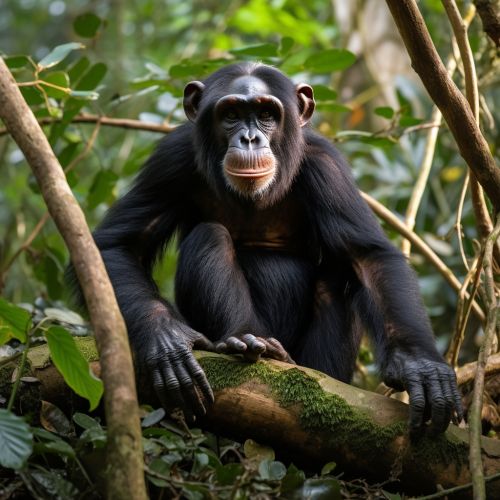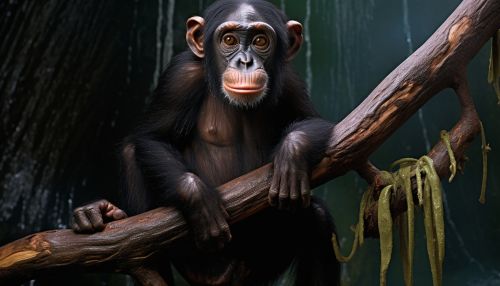Chimpanzee
Taxonomy and Evolution
Chimpanzees belong to the family Hominidae, also known as the great apes. They are classified under the genus Pan, which they share with bonobos, their closest living relatives. The genus Pan diverged from the human lineage, represented by the genus Homo, about 5 to 7 million years ago. This divergence is supported by both fossil evidence and genetic studies.
The genus Pan is part of the subfamily Homininae, which also includes humans and gorillas. The Homininae, in turn, belong to the family Hominidae, which also includes orangutans. The Hominidae are part of the superfamily Hominoidea, which also includes gibbons.


Physical Characteristics
Chimpanzees are medium-sized apes, with males typically larger than females. Adult males can weigh between 35 and 70 kilograms, while females usually weigh between 26 and 50 kilograms. Their bodies are covered with black hair, except for the face, fingers, toes, palms of the hands, and soles of the feet.
Chimpanzees have a robust build and a quadrupedal gait, which they use for both walking and climbing. They have long arms, which are longer than their legs, and large hands with opposable thumbs. Their feet are also prehensile, allowing them to grasp objects and branches.
Behavior and Ecology
Chimpanzees are highly social animals, living in communities that can number from 15 to 150 individuals. These communities are fission-fusion societies, where the size and composition of the group can change throughout the day. They communicate using a complex system of vocalizations, gestures, and facial expressions.
Chimpanzees are omnivorous, feeding on a wide variety of foods including fruits, leaves, bark, honey, insects, and meat. They are known for their use of tools, such as sticks for termite fishing and stones for cracking nuts.
Chimpanzees have a complex mating system, with both males and females mating with multiple partners. Females give birth to a single offspring after a gestation period of about eight months. The young are weaned at about four years of age, but they remain with their mothers for several more years.
Conservation
Chimpanzees are currently listed as endangered by the IUCN. Their populations are declining due to habitat loss, hunting, and disease. Conservation efforts are focused on protecting their habitats, reducing hunting and trade, and promoting sustainable land-use practices.
